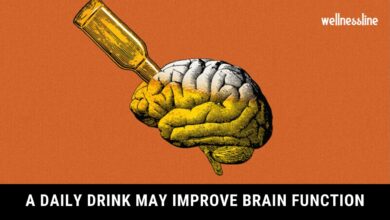
True tales of mom brain and how to get your sharpness back explore the common struggles of mothers with memory and focus, offering practical strategies to regain mental clarity. This journey delves into the complexities of “mom brain,” examining its causes, symptoms, and effective solutions. We’ll uncover real-life stories and practical tips for navigating motherhood’s demands while maintaining mental sharpness.
Understanding the unique challenges mothers face is the first step. This post will cover the science behind “mom brain,” its impact on different types of memory, and how stress and hormones contribute to cognitive changes. We’ll also delve into common misconceptions about motherhood and the cognitive impact.
Understanding “Mom Brain”

The phrase “mom brain” encapsulates the often-reported cognitive challenges mothers face after childbirth. It’s not a medical diagnosis, but a common experience described by mothers worldwide. This phenomenon encompasses a spectrum of difficulties, ranging from minor forgetfulness to more significant cognitive impairments. While the term often carries a sense of negativity, understanding its underlying causes and contributing factors can lead to strategies for managing these challenges and fostering cognitive well-being.The experience of “mom brain” is a multifaceted one, influenced by a complex interplay of factors.
It’s not simply about forgetting things; it’s about a change in cognitive function, often affecting memory, attention, and overall mental sharpness. This impact can be profound, making it crucial to understand the nuanced ways in which motherhood affects the brain.
The Impact of Motherhood on Cognitive Function
The dramatic hormonal shifts experienced during pregnancy and postpartum significantly influence cognitive function. Fluctuations in estrogen, progesterone, and other hormones can impact various brain regions responsible for memory, attention, and executive functions. These changes can lead to increased forgetfulness, difficulty concentrating, and even feelings of mental fog. For instance, the rapid decrease in hormones after childbirth can sometimes contribute to this cognitive shift.
This is further compounded by the sleep deprivation often associated with caring for a newborn.
Types of Memory Affected by Motherhood
The impact of motherhood isn’t uniform across all types of memory. Mothers might experience variations in their working memory, long-term memory, and even procedural memory.
- Working Memory: Working memory, crucial for holding and manipulating information temporarily, often suffers due to the constant demands of childcare. Managing multiple tasks, remembering instructions, and multitasking become more challenging, leading to a feeling of mental overload. For example, trying to remember a shopping list while simultaneously soothing a crying baby can strain working memory capacity.
- Long-Term Memory: Long-term memory, responsible for storing information over extended periods, might also be affected. While memories of significant events might remain intact, recalling seemingly simple details from daily life can become difficult. This is especially true when dealing with the constant barrage of sensory input and emotional demands associated with raising a child.
- Procedural Memory: Procedural memory, responsible for learned skills and habits, can also be impacted. Mothers might find themselves struggling to recall how to perform familiar tasks, like preparing meals or getting ready, due to the intense demands of their new role. For example, a mother used to meticulously following a particular recipe might find it harder to remember the steps precisely while juggling other tasks.
Stress, Hormones, and Cognitive Function
The intense stress associated with motherhood, from sleep deprivation to the emotional demands of caring for a child, directly impacts cognitive function. Chronic stress triggers a cascade of physiological responses, including hormonal changes, which can further impair cognitive processes. The increased cortisol levels, a stress hormone, can negatively affect memory and attention span.
Common Misconceptions About “Mom Brain”
Some common misconceptions about “mom brain” include the idea that it’s a permanent condition or that it’s a sign of poor parenting. In reality, “mom brain” is a temporary, often manageable experience resulting from the complex adjustments mothers make during this life stage. Mothers are not inherently less intelligent; their cognitive abilities are simply impacted by these profound changes in their lives.
Recognizing the Symptoms
Mom brain, a term often used to describe the cognitive challenges mothers face, isn’t a medical diagnosis. Instead, it’s a collection of symptoms related to the unique demands and stresses of motherhood. These symptoms often overlap with normal cognitive fluctuations, making recognition crucial for understanding and addressing the underlying issues. Navigating daily life with young children can significantly impact memory, focus, and other cognitive functions.While the term “mom brain” can be somewhat dismissive, understanding the symptoms can empower mothers to seek support and strategies for managing these challenges.
Recognizing these symptoms is the first step towards reclaiming cognitive clarity and finding effective coping mechanisms.
Typical Signs and Symptoms
The symptoms of “mom brain” are varied and can manifest in numerous ways. Forgetfulness, difficulty concentrating, and a sense of mental fog are common. These symptoms can fluctuate throughout the day, often worsening with fatigue and stress.
Examples of Manifestations in Daily Life
These symptoms can manifest in various ways throughout a mother’s daily routine. Forgetting appointments, misplacing keys, or struggling to recall simple tasks are common examples. Difficulty focusing on work projects, or even conversations, can also be indicators. Simple things like remembering what was on the grocery list or the schedule for the week can become significant challenges.
Common Struggles Related to Memory and Focus
Mothers often experience a range of struggles related to memory and focus. These challenges can impact various aspects of their lives.
- Difficulty remembering appointments or errands:
- Forgetting names or faces:
- Trouble prioritizing tasks:
- Reduced ability to multitask effectively:
- Feeling overwhelmed and disorganized:
This can lead to missed appointments, forgotten errands, and a general sense of disorganization.
This can be frustrating, especially in social settings or when interacting with familiar people.
Managing multiple responsibilities, including childcare, household chores, and work, can make prioritization challenging.
The demands of motherhood often require managing multiple tasks simultaneously, making this difficult.
This is a common consequence of the constant demands and responsibilities of motherhood.
Comparison with Other Cognitive Challenges
Understanding “mom brain” requires distinguishing it from other potential cognitive challenges. The following table highlights key differences.
| Characteristic | Mom Brain | Other Cognitive Challenges (e.g., ADHD, Mild Cognitive Impairment) |
|---|---|---|
| Primary Cause | Stress, sleep deprivation, and the demands of childcare. | Genetic predisposition, brain injury, or other medical conditions. |
| Typical Symptoms | Forgetfulness, difficulty concentrating, and mental fog. | Inattention, impulsivity, difficulty with organization, or memory problems. |
| Impact on Daily Life | Disorganization, missed appointments, and difficulty managing multiple responsibilities. | Difficulties with work, relationships, and daily functioning. |
| Treatment | Stress management techniques, improved sleep hygiene, and time management strategies. | Medical interventions, therapy, and medication (if appropriate). |
Strategies for Sharpening Mental Acuity
Navigating the demands of motherhood often feels like juggling flaming torches while balancing on a unicycle. Mom brain, a phenomenon experienced by many mothers, can significantly impact focus and memory. Fortunately, there are actionable strategies to reclaim mental clarity and sharpen cognitive abilities. Understanding these strategies can equip mothers with the tools they need to effectively manage their multifaceted roles and reclaim their mental sharpness.Effective strategies for managing the demands of motherhood involve more than just sheer willpower; they require intentional approaches to self-care, time management, and cognitive stimulation.
These strategies focus on improving memory and focus, reducing stress, and optimizing daily routines. By incorporating these strategies into their lives, mothers can actively reclaim mental clarity and effectively manage their multiple responsibilities.
Memory Improvement Techniques
Consistent engagement with memory-boosting activities can enhance cognitive function. Engaging in activities that require focus and concentration, like puzzles, reading, or learning a new language, can help strengthen neural pathways and improve memory retention. Remembering to schedule time for activities that challenge your brain can be invaluable.
- Mindfulness and Meditation: Regular mindfulness practices can improve focus and attention span. These techniques help train the mind to stay present and reduce distractions, which can be particularly helpful for mothers juggling numerous tasks. Mindfulness exercises can enhance focus and concentration, which are crucial for improving memory.
- Spaced Repetition: Reviewing information at increasing intervals strengthens memory consolidation. This technique is particularly useful for remembering names, dates, or other facts that need to be recalled over time. For example, reviewing a new skill or fact every few days rather than just once is a highly effective way to solidify memory.
- Mnemonic Devices: Using memory aids like acronyms, rhymes, or visual imagery can help remember complex information. These tools are helpful for remembering lists or facts that might otherwise be challenging to retain.
Self-Care and Stress Reduction
Prioritizing self-care is essential for managing stress and maintaining mental clarity. The demands of motherhood can be overwhelming, and mothers need to prioritize their well-being to function optimally.
- Regular Exercise: Physical activity releases endorphins, which have mood-boosting effects. Even short bursts of exercise can make a difference in reducing stress and improving mental clarity. Regular exercise is an important element in managing stress and maintaining overall well-being. It is also directly linked to improved cognitive function and better sleep quality, which are crucial for managing mom brain.
- Adequate Sleep: Sleep deprivation significantly impacts cognitive function. Aim for 7-9 hours of quality sleep each night. This is crucial for memory consolidation and overall mental well-being. Ensuring enough sleep is vital for reducing stress and improving cognitive performance.
- Healthy Diet: Nourishing the body with a balanced diet provides essential nutrients for brain health. Focus on foods rich in omega-3 fatty acids, antioxidants, and vitamins. Eating a healthy diet is a critical component of overall health, including cognitive function.
Time Management Strategies
Effective time management is key to managing multiple responsibilities. Prioritizing tasks and creating a schedule can help mothers feel less overwhelmed.
- Prioritization Techniques: Use techniques like the Eisenhower Matrix (urgent/important) to categorize tasks and prioritize accordingly. This approach allows mothers to focus on the most critical tasks first, preventing feeling overwhelmed by the demands of daily life.
- Scheduling and Planning: Create a daily or weekly schedule to allocate time for work, household tasks, and personal activities. Scheduling time for self-care and relaxation is just as important as scheduling time for work or other responsibilities.
- Delegation and Outsourcing: Don’t hesitate to delegate tasks whenever possible. Enlist help from family members, friends, or hire services to reduce the workload and improve time efficiency. Delegating tasks is a powerful time management tool that can help reduce stress and improve focus.
Simple Practical Steps
Implementing small, consistent changes can significantly impact mental clarity.
- Setting Realistic Goals: Avoid over-scheduling. Focus on achieving a few key goals each day instead of trying to do everything at once. Setting realistic goals helps manage expectations and prevents feeling overwhelmed by multiple responsibilities.
- Breaking Down Tasks: Large tasks can feel daunting. Break them down into smaller, more manageable steps to make progress easier. Breaking down large tasks into smaller ones makes the process less overwhelming and increases the likelihood of completion.
- Mindful Breaks: Take short breaks throughout the day to rest and recharge. Engage in activities that promote relaxation, such as listening to music or taking a walk. Mindful breaks are important for preventing burnout and maintaining focus throughout the day.
Practical Applications and Examples
Mom brain, that fuzzy feeling of forgetfulness and mental fog, is a common experience for mothers. It’s not a sign of failing intelligence, but rather a consequence of the incredible demands on a mother’s time and energy. Fortunately, practical strategies can significantly improve mental clarity and help mothers reclaim their sharpness.Understanding the root causes and implementing the right tools is key to managing these challenges effectively.
Ever felt like your brain’s on autopilot? Mom brain, right? Finding ways to sharpen your focus is key, and sometimes it’s about more than just coffee. While excessive drinking can have a detrimental impact on your cognitive function, even for moderate drinkers going on a binge can raise health risks, impacting your ability to think clearly. This is something to consider when trying to reclaim your sharpness and conquer that mom brain fog.
So, next time you’re aiming for mental clarity, prioritize healthy habits for a more focused and sharp you. even for moderate drinkers going on a binge can raise health risks It’s all about finding the balance for a sharper mind.
By incorporating these methods into daily life, mothers can experience tangible improvements in their cognitive abilities and overall well-being.
Real-Life Scenarios and Success Stories
Many mothers have successfully implemented strategies to combat mom brain. One mother, Sarah, found that using a digital calendar and a dedicated note-taking app dramatically reduced her stress and improved her focus. Another, Emily, prioritized her sleep and found that even 30 minutes of daily meditation significantly improved her mental clarity and emotional regulation. These experiences highlight the positive impact of proactive strategies in managing the demands of motherhood.
Organizing Daily Routines and Schedules
Effective organization is crucial for managing the many responsibilities of motherhood. A well-structured daily routine provides a framework for tasks, reducing the mental load and promoting efficiency. A consistent schedule helps children anticipate routines, making transitions smoother and less stressful for everyone.
| Method | Description | Example |
|---|---|---|
| Daily Planner | A physical or digital tool to list daily tasks, appointments, and deadlines. | Using a daily planner to schedule appointments, grocery shopping, and homework help. |
| Time Blocking | Allocating specific time slots for particular tasks. | Setting aside 30 minutes for meal preparation, 1 hour for household chores, and 1 hour for work. |
| To-Do Lists | Creating a list of tasks to be completed. | Creating a to-do list for errands, appointments, and household chores, prioritizing tasks based on urgency and importance. |
| Color-Coding | Using different colors to categorize tasks and appointments. | Using different colors for work-related tasks, appointments, and household chores in a planner or calendar. |
Time Management Techniques
Different time management techniques can be beneficial in various situations. By understanding the strengths and weaknesses of each approach, mothers can choose the most effective methods for their individual needs and circumstances.
| Technique | Description | Example |
|---|---|---|
| The Eisenhower Matrix | Prioritizing tasks based on urgency and importance (urgent/important, important/not urgent, urgent/not important, not urgent/not important). | Listing tasks such as paying bills (urgent/important), planning a family outing (important/not urgent), responding to emails (urgent/not important), and light housekeeping (not urgent/not important). |
| Pomodoro Technique | Working in focused intervals (e.g., 25 minutes) followed by short breaks. | Working on a project for 25 minutes, taking a 5-minute break, repeating the cycle. |
| Eat the Frog | Tackling the most challenging task first thing in the morning. | Addressing a complex work project or difficult household chore as soon as possible in the day. |
| Pareto Principle (80/20 Rule) | Focusing on the 20% of tasks that yield 80% of results. | Identifying the most important tasks that will produce the most significant results and concentrating on them. |
Creating a Supportive Environment
A supportive environment is essential for mothers to prioritize their well-being. Encouraging open communication with family members, seeking help from others, and setting healthy boundaries are vital components of this environment.
“Prioritizing self-care is not selfish; it’s essential for being the best version of yourself for your family.”
Mothers can create this supportive environment by openly communicating their needs and limitations, seeking help from family members or friends, and setting clear boundaries with work and other responsibilities. This fosters a positive environment where mothers can focus on their well-being without feeling guilty or overwhelmed.
Maintaining Focus and Concentration
Juggling motherhood with career demands, household chores, and personal well-being can leave us feeling mentally scattered. Maintaining focus and concentration is crucial for navigating these complexities and reclaiming our mental clarity. Fortunately, strategies exist to help us regain and maintain this precious resource.Effective focus and concentration are not innate; they are skills that can be cultivated and strengthened.
By understanding the underlying principles and employing practical techniques, we can significantly improve our ability to stay on task and achieve our goals, both personally and professionally.
Ever felt like your brain’s on autopilot? Those “true tales of mom brain” are real, aren’t they? Finding ways to sharpen focus is key, and sometimes simple tweaks make a big difference. For example, exploring low carb diets and performance can reveal surprising ways to boost cognitive function. low carb diets and performance often show how a well-balanced approach to eating can positively impact mental clarity.
Ultimately, reclaiming your sharpness is about finding the right strategies for your unique needs, and those strategies often lead back to a healthier you, both mentally and physically.
Establishing Routines and Habits
Consistent routines and habits provide a framework for our day, creating a sense of structure and predictability. This predictability reduces mental clutter, allowing our minds to focus on the task at hand without the constant barrage of decision fatigue. Establishing a daily schedule, even a loose one, can greatly aid in this process. This includes setting specific times for work, household tasks, and personal activities.
A well-structured routine minimizes the need for constant decision-making, freeing up mental resources for concentration.
Staying Organized and Managing Distractions
Organization is key to maintaining focus. A cluttered environment often translates to a cluttered mind. Designate specific spaces for work, and keep these spaces organized. A clean workspace can minimize visual distractions and allow for more focused work. Furthermore, implementing strategies for managing distractions is essential.
Turn off notifications on your phone and computer, and use website blockers to avoid unwanted interruptions. Consider using noise-canceling headphones or finding a quiet workspace to minimize auditory distractions. Prioritize tasks and create to-do lists. Breaking down large tasks into smaller, manageable steps helps reduce feelings of overwhelm and fosters a sense of accomplishment, thereby improving focus.
Minimizing Interruptions and Maximizing Productivity
Interruptions are notorious for derailing focus. Identify common interruptions in your day and develop strategies to minimize them. This might involve setting specific times for responding to emails or phone calls, or using tools to schedule time blocks for specific tasks. Scheduling focused work periods, often called the “Pomodoro Technique,” where you work in concentrated bursts followed by short breaks, can significantly enhance productivity and concentration.
Communicate your need for uninterrupted time to family members or colleagues.
Incorporating Mindfulness and Meditation
Mindfulness and meditation practices cultivate present-moment awareness, a critical element in maintaining focus. By training your mind to be present in the current moment, you can better resist the pull of distractions and thoughts that wander. Even short mindfulness exercises, like a few minutes of deep breathing or focusing on your senses, can significantly enhance focus. Daily meditation can help you develop greater self-awareness, reduce stress, and improve concentration.
Tools and Resources: True Tales Of Mom Brain And How To Get Your Sharpness Back
Navigating motherhood often feels like juggling a thousand balls, and your brain is one of the most critical items on that list. Fortunately, there are a plethora of tools and resources available to help you stay organized, focused, and connected to your well-being. These tools can help you manage your to-do lists, track important dates, and connect with other mothers facing similar challenges.Understanding the value of these resources is key to effectively using them to enhance your mental sharpness and overall well-being.
They provide practical support and strategies for managing the unique demands of motherhood, ultimately empowering you to regain control and reclaim your mental focus.
Digital Tools for Organization and Task Management
Digital tools are invaluable for managing the complexities of modern motherhood. From scheduling appointments to keeping track of school projects, these apps can streamline your life and reduce stress. Effective use of digital tools can significantly reduce the mental load associated with everyday tasks, allowing you to focus on what truly matters.
- To-Do List and Calendar Apps: Apps like Todoist, Any.do, Google Calendar, and Outlook Calendar allow you to create detailed to-do lists, set reminders, and schedule appointments. These tools offer various features, such as task prioritization, recurring events, and integration with other apps, streamlining your daily tasks. Their ability to visualize your schedule and prioritize tasks can significantly reduce mental clutter and enhance your productivity.
- Note-Taking and Organization Apps: Evernote, OneNote, and Google Keep allow you to capture ideas, thoughts, and important information quickly. The ability to organize notes by project, tag, or color code can make finding specific information a breeze, especially when juggling multiple children and their diverse needs. The integration with other apps often enhances workflow and facilitates better coordination.
- Project Management Apps: Trello, Asana, and Monday.com are designed for managing larger projects, like organizing family events, school projects, or even household chores. These tools facilitate collaboration, provide clear visual representations of progress, and assign tasks, reducing the sense of overwhelming responsibility. Their collaborative features are particularly useful for families where multiple members contribute.
Websites and Online Communities for Support
Connecting with other mothers can be incredibly beneficial, offering valuable insights, advice, and emotional support. Websites and online communities dedicated to parenting provide a safe space to share experiences, ask questions, and find practical solutions to everyday challenges.
- Parenting Forums and Blogs: Websites like Reddit’s r/Parenting, BabyCenter, and numerous parenting blogs offer valuable advice, personal stories, and practical tips. They provide a platform to connect with mothers who understand the unique challenges of raising children. These platforms offer valuable perspectives and coping mechanisms.
- Online Support Groups: Dedicated online support groups for mothers facing specific issues, such as postpartum depression, anxiety, or sleep deprivation, offer a safe and supportive environment. These communities provide a space for open dialogue, shared experiences, and professional advice, helping mothers feel less isolated and more connected.
Books on Mental Well-being and Productivity
Books provide valuable insights and practical strategies for managing stress, enhancing focus, and improving overall well-being. These resources can offer long-term solutions and provide strategies that are adaptable to diverse situations.
- Self-Help Books on Time Management and Productivity: Books like “Getting Things Done” by David Allen and “The 7 Habits of Highly Effective People” by Stephen Covey offer practical frameworks for time management, task prioritization, and stress reduction. They offer valuable strategies for organization, planning, and prioritization.
- Books on Mindfulness and Stress Reduction: Books on mindfulness and stress reduction, such as “Wherever You Go, There You Are” by Jon Kabat-Zinn, offer valuable techniques for managing stress and enhancing mental clarity. These techniques can help mothers develop coping mechanisms for dealing with the challenges of motherhood.
| Resource | Description | Benefits |
|---|---|---|
| Todoist | To-do list and project management app | Prioritizes tasks, sets reminders, and integrates with other apps |
| BabyCenter | Parenting website and forum | Provides advice, support, and connections with other parents |
| “Getting Things Done” | Time management book | Offers practical frameworks for organization, planning, and prioritization |
Addressing Specific Challenges
Navigating motherhood is a unique journey, filled with both joys and significant challenges. One of the most common struggles faced by mothers is the constant juggling act of responsibilities, leading to fatigue, stress, and a feeling of being overwhelmed. This section delves into practical strategies for managing specific hurdles mothers encounter, emphasizing the crucial role of support networks and self-care in reclaiming mental clarity.
Managing Fatigue and Exhaustion
Chronic fatigue is a common companion for mothers, often stemming from sleep deprivation, demanding schedules, and the relentless demands of childcare. Effective management requires proactive strategies. Prioritizing sleep, even in short bursts, is essential. Napping when possible, or strategically scheduling downtime, can significantly impact energy levels. Creating a routine for self-care, even if it’s just 15 minutes, is crucial.
This could involve a relaxing bath, reading a book, or simply enjoying a quiet cup of tea.
Mom brain is real, folks! It’s those constant worries, juggling schedules, and the sheer exhaustion that zaps your focus. But did you know that toddlers are often consuming more sugar than the recommended daily allowance for adults? It’s a sugar-fueled rollercoaster, impacting both their tiny bodies and your ability to concentrate! Thankfully, prioritizing healthy habits like sleep, balanced meals, and mindfulness can help you regain that mental clarity.
Addressing the hidden culprits, like the surprising amount of sugar in toddler snacks, is key to reclaiming your sharpness. Check out this fascinating article on toddlers eating more sugar than recommended for adults for more insights. Finding those little pockets of time for yourself, even if it’s just 15 minutes, can significantly improve your mental well-being and help you tackle those mom brain challenges head-on.
Importance of Seeking Support from Other Mothers
Mothers often feel isolated in their struggles. Connecting with other mothers creates a sense of community and shared understanding. This shared experience provides valuable insights, support, and encouragement. Shared struggles and experiences are crucial for fostering a supportive network. Sharing advice, coping mechanisms, and resources with fellow mothers can be empowering and reassuring.
Building a Support Network
Building a supportive network is a key element in navigating the complexities of motherhood. This network can include family, friends, or other mothers. It’s important to actively reach out and cultivate these connections. Joining local mother’s groups, attending parenting workshops, or simply connecting with friends online can help establish this vital support system. These connections provide emotional and practical assistance during times of need.
Asking for Help and Support
Asking for help is a sign of strength, not weakness. Many mothers feel reluctant to burden others with their needs, but it’s essential to acknowledge that support is available and beneficial. Clearly communicate needs and preferences to family and friends. For example, asking for help with childcare, errands, or meal preparation can lighten the load and alleviate stress.
Specific requests, like “Could you pick up the kids from school on Tuesday?” or “Would you be willing to watch the baby for an hour so I can have some time to myself?” demonstrate clarity and make it easier for others to assist.
Long-Term Strategies
Recovering and maintaining mental sharpness isn’t a one-time fix; it’s a continuous journey. Long-term strategies are crucial for mothers to cultivate a lifestyle that supports their cognitive well-being, allowing them to navigate the complexities of motherhood and beyond with greater ease and clarity. These strategies aren’t about sacrificing family time; rather, they’re about incorporating practices that enhance overall well-being, leading to a more focused and resilient mind.Effective long-term strategies for maintaining mental sharpness are about building sustainable habits that integrate into daily routines.
These routines aren’t rigid dictates but rather flexible frameworks that evolve alongside life’s changing demands. By understanding the importance of consistent self-care, dedicated learning, and a structured approach to daily life, mothers can foster a mind that remains sharp and adaptable over the long haul.
Establishing a Consistent Routine
A well-structured daily routine is paramount for mental clarity. A predictable schedule helps manage stress, improve focus, and foster a sense of control in a sometimes chaotic environment. This routine allows the mind to anticipate tasks and transitions, reducing mental load and promoting a sense of calm.
- Prioritize Sleep: Aim for 7-9 hours of quality sleep each night. Establish a relaxing bedtime routine to signal to your body it’s time to wind down. This might include a warm bath, reading a book, or practicing gentle stretches.
- Schedule Dedicated “Me Time”: Carve out time for activities that bring you joy and relaxation. This could be anything from a daily walk in nature to pursuing a hobby or simply enjoying a quiet cup of tea. Even 15-30 minutes can make a significant difference.
- Time Management Techniques: Utilize techniques like the Pomodoro Technique or time blocking to manage tasks effectively. Breaking down large tasks into smaller, manageable chunks can reduce overwhelm and improve focus.
Incorporating Self-Care into Daily Routines
Self-care isn’t a luxury; it’s a necessity for maintaining mental well-being. Integrating self-care into daily routines creates a buffer against stress and promotes a sense of balance.
| Activity | Description | Frequency | Example |
|---|---|---|---|
| Mindfulness/Meditation | Practicing present-moment awareness through focused attention. | Daily (5-10 minutes) | Guided meditation apps or simply sitting quietly and focusing on your breath. |
| Physical Activity | Engaging in exercise or movement. | 3-4 times per week (30 minutes) | Walking, yoga, or a short gym session. |
| Healthy Diet | Consuming nutrient-rich foods. | Daily | Including fruits, vegetables, lean proteins, and whole grains. |
| Social Connection | Connecting with loved ones. | Regularly | Spending time with family and friends or joining a support group. |
Intellectual Stimulation and Learning, True tales of mom brain and how to get your sharpness back
Continuous learning and intellectual stimulation are essential for maintaining mental agility. Engaging in activities that challenge your mind keeps your cognitive skills sharp and fosters a sense of accomplishment.
- Reading: Dedicate time to reading books, articles, or engaging in online courses. Expand your knowledge and understanding of different topics.
- Learning a New Skill: Take an online course, learn a new language, or explore a creative pursuit like painting or playing a musical instrument. This challenges your brain and enhances its plasticity.
- Engaging in Puzzles and Games: Sudoku, crossword puzzles, or strategy games can help sharpen cognitive skills and improve focus.
Closing Summary

In conclusion, true tales of mom brain and how to get your sharpness back show that regaining mental clarity is possible with the right strategies. By understanding the causes and symptoms, implementing self-care techniques, and building supportive routines, mothers can effectively manage their cognitive challenges and reclaim their focus. Remember, you’re not alone, and there are resources and strategies available to help you navigate this journey.
It’s a journey of self-discovery and empowerment, allowing you to prioritize your well-being and maintain your mental sharpness.





